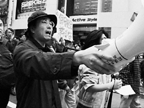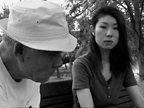“Cinema Juku”
-
c/o Shisso Productions, 1-34-13-502 Shinjuku, Shinjuku-ku, Tokyo 160-0022 JAPAN
Phone: 81-3-3350-7812 Fax: 81-3-5360-1669
E-mail: cinema_juku@hotmail.com URL: www.cinema-juku.com
“Cinema Juku” began as a summer workshop at the Hagi International Festival of Film Art in 1995, initiated by film director Hara Kazuo. In 1999 Juku members made their first documentary film, My Mishima, which was theatrically released. Since 1997, a four-day seminar called Osaka “Cinema Juku” has been held every autumn. In 2001 around forty people answered the call to “devote yourselves to filmmaking for a year!” and nine documentary films were completed and shown in a series of independent screenings in Tokyo and Osaka. Hara Kazuo’s on-location seminar was started in 2002 with the Film School of Tokyo as a project to nurture professional filmmakers. Currently eleven people are taking part.
 Just a Life
Just a Life
(“Kakegae no zenshin”)- 2002 / Color / Video / 43 min
Director: Nagaoka Noa
Photography: Saito Emiko
Editing: Habara Yusuke
Sound: Kakimoto Norikazu
Line Producer: Sakai Mihoko
Ebata Kazuki became a psychiatric patient at the age of twenty-seven. With a loudspeaker and firecrackers he shouts his opposition to the Medical Treatment Supervision Bill. He doubts whether we can ascertain that a mental patient who committed a serious crime while non compos mentis is no longer dangerous. The filmmakers reflect on coexistence with others in contemporary society through Ebata’s personal story and life with his fellow patients.
| Nagaoka Noa Born in Kyoto in 1972. Graduated from Ritsumeikan University, College of Letters, majoring in English and American literature. Created Just a Life from 2001 to 2002 as part of Hara Kazuo’s “in practice” seminar at “CinemaJuku.” |
 Daughter and Father
Daughter and Father
(“Retaa”)- 2002 / Color / Video / 50 min
Director, Photography: Tsumoto Mari
Editing, Sound, Music: Ando Jun
Line Producer: Higa Yuzo
Narrative Structure: Inui Nobuyuki
Planning: Fujita Naomi, Inui Nobuyuki
For ten years Fujita Naomi lived through the hardships of truancy and social withdrawal. The existence of her abusive father kept her in emotional shackles. She returns to the home she left behind to confront her own negative feelings in front of the camera. Her actions break the family peace.
| Tsumoto Mari Born in 1973. Graduated from Osaka Women’s University Graduate School majoring in literature in 1998. Worked as a still photography studio assistant from 1999 to 2001, and joined “CinemaJuku” from 2001 to 2002. |
• Doc Schools | Japan Academy of Moving Images | “Cinema Juku” | The Film School of Tokyo | Tohoku University of Art & Design | Symposium |
